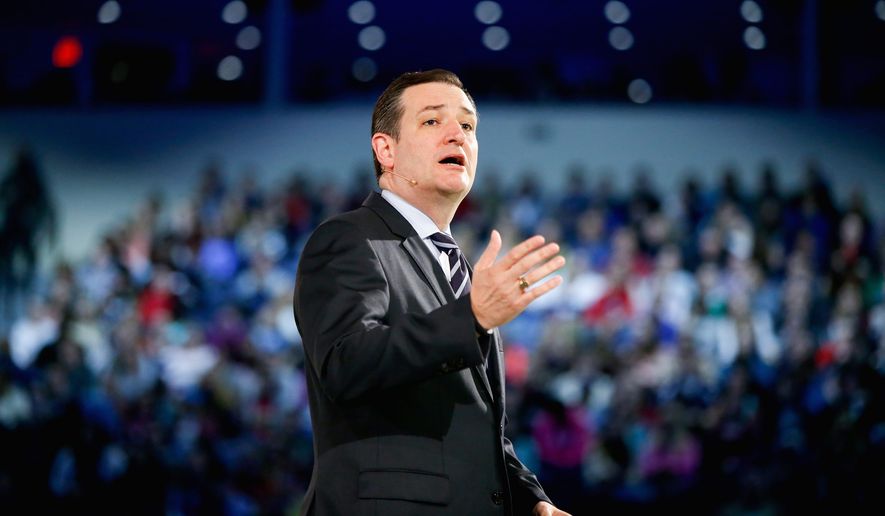OPINION:
ANALYSIS/OPINION:
Ted Cruz, a first-term senator from Texas who wants to be president, has a simple plan: Be Christian — and talk about it a lot — and channel Ronald Reagan.
Rafael Edward “Ted” Cruz, 44, polling right now in the low single digits in presidential polls, did both Monday when he announced that he is running for the White House.
“There are people who wonder if faith is real,” Mr. Cruz said at Liberty University. “I can tell you, in my family there’s not a second of doubt, because were it not for the transformative love of Jesus Christ, I wouldn’t have been saved and I would have been raised by a single mom.”
“God’s blessing has been on America from the very beginning of this nation — and I believe God isn’t done with America yet,” he said to cheers from thousands packed into an arena at the world’s largest Christian university.
Mr. Cruz also sought to portray himself as heir to conservative hero Ronald Reagan, railing at big government, warning about waning liberty — and twice using the Gipper’s catchphrase about America.
“This is our fight. The answer will not come from Washington. It will come only from the men and women across this country, from men and women, from people of faith, from lovers of liberty, from people who respect the Constitution. It will only come as it has come at every other time of challenge in this country, when the American people stand together and say we will get back to the principles that have made this country great. We will get back and restore that shining city on a hill that is the United States of America,” he said.
Like Reagan, who called for the abolition of the U.S. Energy and Education departments, Mr. Cruz said that if elected, he would do away with the Internal Revenue Service and, on the five-year anniversary of the Affordable Care Act, vowed to repeal “every word of Obamacare.” And he pledged to get rid of Common Core, an educational program despised by conservatives, which drew whoops from the mostly young crowd.
Mr. Cruz is making no bones, either, about his dyed-in-the-wool conservative. While Jeb Bush is calling himself a “principled conservative” (and sometimes, in a mockable phrase, a “practicing conservative”), Mr. Cruz three times used the term “courageous conservative.”
The term will play big across the red states of America. For the past two elections, the Republican Party nominated more moderate candidates: Sen. John McCain, beloved by the U.S. mainstream media as a “maverick” who would buck the Grand Old Party; and Mitt Romney, who supported a version of Obamacare in his state while governor of ultraliberal Massachusetts.
Jeb’s brother, George W. Bush, first stuck a modifier on “conservative” when he ran in 2000, calling himself a “compassionate conservative.” But the hard-core right and its mouthpieces, like radio talk show host Rush Limbaugh, were not big fans. He barely won in his first election as only 68 percent of evangelicals supported him. That jumped 10 percent four years later, but millions of evangelicals stayed home, making for another tight election.
For Mr. McCain, it was even worse. He won nearly 2 million fewer evangelical votes than Mr. Bush had in 2004. Mr. Romney, a Mormon, won more in 2012, but still not enough. And ever since, the power brokers in the GOP have been courting the “missing evangelicals.”
Hence Mr. Cruz’s choice of the venue — Liberty University. Founded in 1971 by Jerry Falwell, an evangelical televangelist and icon of the religious right, the school served as the perfect backdrop for a speech by a candidate seeking to paint himself as the Christian conservative candidate in the field (and it didn’t hurt that university students were required to attend the Monday “convocation” in the campus’ Vines Center).
The tea party darling’s entrance into the race — the first to announce officially — also reshuffles the deck. Mr. Cruz will be looking for support from those who have backed former Arkansas Gov. Mike Huckabee and former Sen. Rick Santorum of Pennsylvania, both of whom play to the faith crowd, and even upstart hopeful neurosurgeon Ben Carson, who sees his niche appeal ebbing quickly.
More, the early announcement gives Mr. Cruz a head start on more establishment candidates, like Mr. Bush, Wisconsin Gov. Scott Walker and New Jersey Gov. Chris Christie. The move also leaves Sen. Rand Paul of Kentucky, with his staunch libertarian credentials, in no man’s land. As Mr. Cruz declared, “The way we get to 51 percent is we bring together conservatives and libertarians and evangelicals.”
“Today, roughly half of born-again Christians aren’t voting. They’re staying home. Imagine instead millions of people of faith all across America coming out to the polls and voting our values,” Mr. Cruz said in his powerful 30-minute speech, during which he used no notes, no teleprompter.
Mr. Cruz’s fate won’t be known for months. But his early entrance into the race brought swift reaction from Democrats after he announced on Twitter: “I’m running for president.”
“If you’re like us, just reading that phrase probably sent shivers down your spine or produced a pretty serious roll of the eyes,” said the Democratic National Committee — a response that no doubt made the senator from Texas smile.
• Joseph Curl covered the White House and politics for a decade for The Washington Times. He can be reached at josephcurl@gmail.com and on Twitter @josephcurl.




Please read our comment policy before commenting.